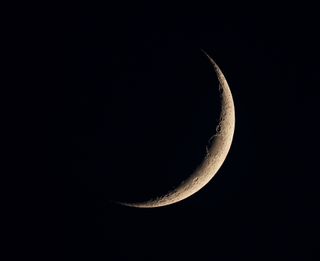New Moon and Islamic Calendar Star in Slooh Webcast Today

Slooh Community Observatory will give viewers a rare sight of the new moon today (Aug. 5) from its telescope in the Canary Islands in a broadcast that will also discuss the importance of the new moon in the Islamic calendar.
The broadcast starts at 2 p.m. EDT (6 p.m. GMT) and is available at live.slooh.com. You can also watch it here on Space.com, courtesy of Slooh.
"During the live broadcast, Slooh host Paul Cox will be joined by Shaykh Abdulbary Yahya to explore the importance of the moon, specifically the new moon, to the Muslim faith," Slooh representatives wrote in a statement. "They’ll discuss the practice of moon sighting, and explore use by Muslims worldwide of a lunar calendar to determine dates of religious holidays, etc., rather than a solar one." [Moon's Phases Are a Lunar Delight for Stargazers]
The Islamic calendar is different from the Gregorian calendar, which we are familiar with in the United States. New Gregorian months happen at predictable intervals that are the same every year (except for leap years, which add an extra day to February every four years). In the Islamic calendar, new months can only begin once the new moon arrives (on the 29th or 30th day of each lunar cycle).
How the new month begins also varies by different Islamic schools, according to Slooh. Some allow for astronomical calculation, while others require a physical sighting by a member of the faith. How the moon is seen also depends on what school you belong to. Some allow for sightings with binoculars or telescopes, while others require naked-eye observations only.
The new moon is called the Hilal in Islamic culture. "This month, Slooh will be adding its own group of telescopes in the Canary Islands to assist in the sighting of the Hilal," Slooh said in the same statement.
Joining Cox and Yahya will be Slooh astronomer Bob Berman, who will discuss why the new moon is so difficult to see through a telescope. The new moon happens when the moon moves approximately between the Earth and the sun. The moon is completely dark when it's situated right in between, but a crescent is visible again as the moon begins to move out of the way.
Get the Space.com Newsletter
Breaking space news, the latest updates on rocket launches, skywatching events and more!
Viewers can take part in the discussion on the Slooh website or on Twitter (by tweeting @Slooh).
Follow Elizabeth Howell @howellspace, or Space.com @Spacedotcom. We're also on Facebook and Google+. Original article on Space.com.
Join our Space Forums to keep talking space on the latest missions, night sky and more! And if you have a news tip, correction or comment, let us know at: community@space.com.

Elizabeth Howell (she/her), Ph.D., is a staff writer in the spaceflight channel since 2022 covering diversity, education and gaming as well. She was contributing writer for Space.com for 10 years before joining full-time. Elizabeth's reporting includes multiple exclusives with the White House and Office of the Vice-President of the United States, an exclusive conversation with aspiring space tourist (and NSYNC bassist) Lance Bass, speaking several times with the International Space Station, witnessing five human spaceflight launches on two continents, flying parabolic, working inside a spacesuit, and participating in a simulated Mars mission. Her latest book, "Why Am I Taller?", is co-written with astronaut Dave Williams. Elizabeth holds a Ph.D. and M.Sc. in Space Studies from the University of North Dakota, a Bachelor of Journalism from Canada's Carleton University and a Bachelor of History from Canada's Athabasca University. Elizabeth is also a post-secondary instructor in communications and science at several institutions since 2015; her experience includes developing and teaching an astronomy course at Canada's Algonquin College (with Indigenous content as well) to more than 1,000 students since 2020. Elizabeth first got interested in space after watching the movie Apollo 13 in 1996, and still wants to be an astronaut someday. Mastodon: https://qoto.org/@howellspace
